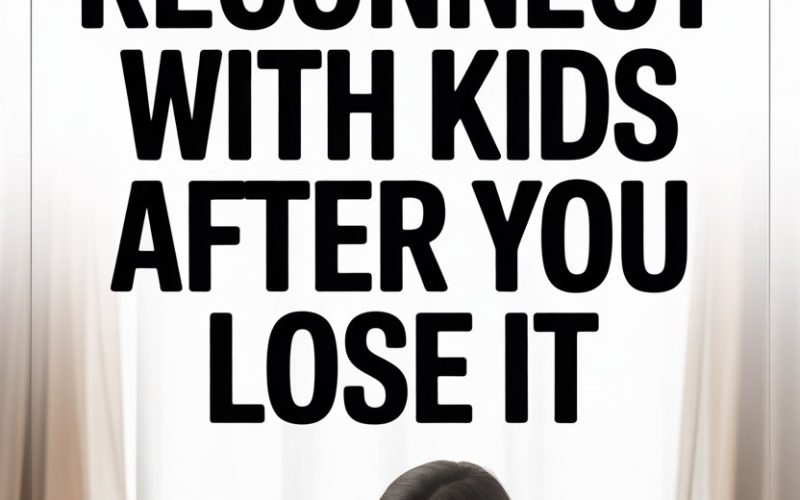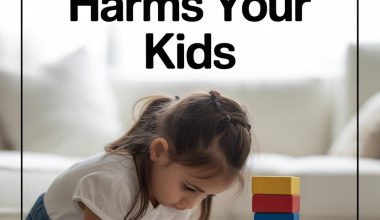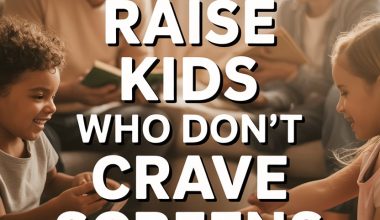Ever felt like you just auditioned for a soap opera when you yelled at the kids, slammed a door, or threatened to throw everyone’s tablets in the bin? Take a number and join the parent club.
If you’re reading this, chances are your last parenting moment was less Mary Poppins, more Godzilla.
Now, you’re left with a pit in your stomach and a little one giving you that look—the one that says, “Who are you and what have you done with my slightly less terrifying parent?”
Here’s the good news: repair is possible. Science backs it up, kids are resilient, and you’re not the only grownup who’s ever lost their cool.
Now it’s time to build that bridge back—without self-flagellation, empty bribes, or “I’m sorry, but you made me” apologies.
Just Breathe—Seriously
It sounds ridiculously simple, but the path to repair starts with one deep breath. After a meltdown (yours, not theirs), your nervous system is still on high alert, and your brain is convinced you’re wrestling a bear, not parenting a child.
Before you try to fix things, take a moment. Step outside, splash water on your face, or (if you’re lucky) hide in the loo for sixty seconds.
Research on parental self-regulation (check out the findings from the Center on the Developing Child at Harvard) shows that kids borrow calm from adults. If you’re not calm, they won’t feel safe repairing anything.
A clear head makes space for genuine connection—not panic-fueled apologies.
Own the Mess—No Excuses
Apologizing to your child after you’ve lost it can feel like eating crow, but nothing builds trust like genuine accountability.
Don’t blame the tantrum, the spilled juice, or “a really bad workday.” Keep it simple: “I yelled and that was wrong. I’m sorry I scared you.”
Experts, including Dr. Becky Kennedy, emphasize that a real apology is about your actions, not their behavior. Kids get a masterclass in humility and courage when you fess up.
No “buts,” no finger-pointing, just the awkward, brave truth. Children are astonishingly forgiving when they see your vulnerable side—much more so than most adults, frankly.
Make Space for Their Feelings—Even the Stormy Ones
After you’ve apologized, your child might need to let you know how it felt. This is the tricky bit.
You might hear, “You scared me!” or “I don’t like you anymore!” or, if you’re raising dramatic types, “You broke my heart!” Stay open. Channel your inner therapist.
Try, “That was too loud, wasn’t it?” or “It’s okay if you feel mad at me.” Their little brains are still learning about feelings, and you’re teaching them that everyone messes up—and that it’s safe to talk about it.
Want a model for how this looks? Attachment research, highlighted by Dr. Daniel Siegel, shows that kids need to feel seen and soothed before they can move on.
If you can bear witness to their big feelings, you’re already halfway back to connection.
Physical Reconnection Works Wonders
After a squabble, many kids crave physical reassurance. A hug, a cuddle on the sofa, even sitting together quietly can do more to heal than a thousand words.
Sometimes, an apology lands best when followed by a gentle touch—if your child is open to it.
But don’t force it. Some kids need time before they’re up for affection. (And some grownups do, too. Don’t forget yourself in this mix.)
Offering a blanket or sitting nearby can send the message: “I’m here when you’re ready.” Consider this your permission slip to be the soft place to land, even if you feel like the one who tripped them in the first place.
Humor—Your Secret Weapon
It’s hard to stay angry at someone who can make you laugh. If the mood allows, a well-timed silly face, a goofy apology (“Next time I’ll roar like a friendly dinosaur, not a scary one”), or a shared inside joke can melt the ice.
Humor doesn’t erase hurt, but it signals that the storm has passed and there’s room for joy again.
Just keep it gentle. This isn’t the moment for sarcasm or poking fun at their feelings—save that for your next group chat vent session.
Rewind and Replay—Try a Do-Over
Mulligans aren’t just for golfers. Suggest a “do-over”: “Can we try that again, but with less shouting and more listening?”
Not only does this defuse tension, but it lets kids practice expressing themselves (and hearing you) in a way that’s less, well, operatic.
Child development experts like Dr. Mona Delahooke recommend this as a concrete way to show kids that relationships can withstand bumps—and that everyone gets another go.
Sometimes, you’ll both end up giggling as you act out the “yelly” bit before switching to “gentle voices”—and that’s connection in action.
Repair Rituals—Create Your Own
Every family has their own language for making up. Some households swear by group hugs, others by drawing apology pictures, sharing a treat, or reading a favorite book together.
These rituals send a powerful message: even after a blowup, you belong together.
If you haven’t stumbled on your family’s version yet, try experimenting. Maybe it’s a cup of cocoa, a five-minute “feelings check-in,” or a walk around the block.
Over time, these habits become emotional glue. (No, “shoving biscuits under the door” does not count—tempting as it is.)
Talk About Triggers—When the Dust Settles
Once everyone’s calm and cuddly again, peek under the hood: What set off the fireworks? Did you snap after the fifth whinge about screen time? Was it the 400th sibling squabble?
Chatting about triggers with kids (once they’re old enough) is a great way to problem-solve together. Try: “I get cranky when I’m really tired. Maybe we both need some quiet time next time we feel grumpy.”
You’re not just apologizing—you’re modeling emotional intelligence.
Bonus: this builds resilience for next time, because, let’s be honest, there will be a next time.
Self-Compassion—Don’t Be Your Own Worst Enemy
The parental guilt hangover hits hard after you lose it. You replay the meltdown in your head, convinced you’ve permanently scarred your child and won’t be invited to future Mother’s or Father’s Days.
Take it from the therapists: self-compassion isn’t just fluff, it’s vital to repairing relationships with your kids. Research from Dr. Kristin Neff’s work shows that parents who treat themselves kindly after mistakes are less likely to repeat them.
Try speaking to yourself in the same voice you’d use for a friend in your shoes. Kids don’t need perfection—they need a parent who can show up again after a bad day.
Bring in Playfulness—Even After a Blowup
After tears and apologies, reconnecting through play resets the mood. Toss a ball, build a pillow fort, play a board game (and maybe lose graciously, just this once).
Laughter is a shortcut to connection, and it reminds your child that your relationship is bigger than any single ugly moment.
For little ones, roughhousing can work wonders—play wrestling, piggyback rides, or silly dance parties release lingering stress for both of you. Older kids might go for a walk, shoot hoops, or just share memes.
Rediscovering fun together rebuilds trust and reminds everyone: we’re still us.
Lay Down the Guilt—Connection Over Perfection
No parent enjoys losing it, but ruptures are part of family life. What matters most is what comes next—not how perfectly you parented in the heat of the moment.
Kids don’t need a flawless role model. They need to see what honesty, humility, and repair look like—because they’ll need those skills in every relationship they ever have.
Tonight (or tomorrow, or the next time you find yourself apologizing with chocolate biscuits in hand), remember: every repair is a chance to show your child that love can handle a few bumps.
And you? You’re still the grownup they need—meltdowns and all.
From Meltdown to Meaningful Moments
Messy blowups don’t have to mean broken bonds. The magic lies in what happens after—the apology, the hug, the giggle, the wobbly promise to try again.
Kids will remember your willingness to make it right long after they forget what set you off in the first place.
So here’s to the parents who yell, apologize, and keep loving anyway.
Perfection is overrated. Connection is where the real parenting magic lives.





